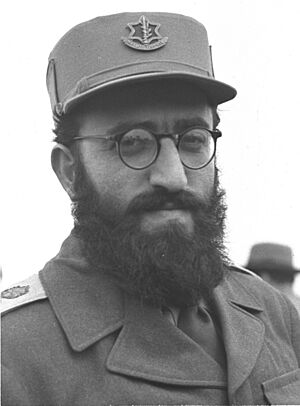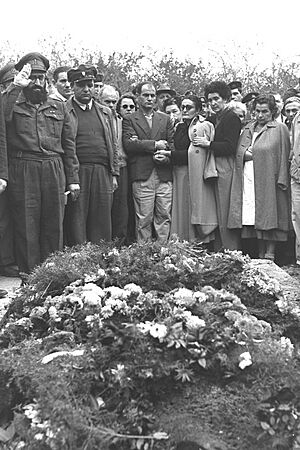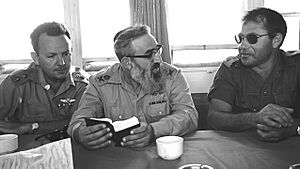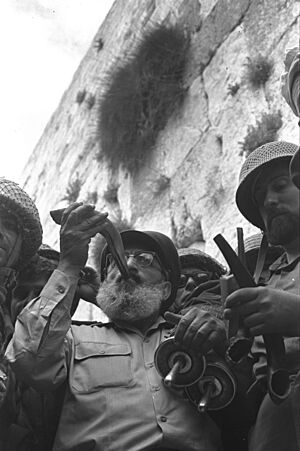Shlomo Goren facts for kids
Shlomo Goren (born February 3, 1917 – died October 29, 1994) was an important Israeli rabbi and scholar. He was born in Poland. As an Orthodox Jew and a Religious Zionist, he was a leading expert on Jewish religious law, called halakha. In 1948, Rabbi Goren started and led the Military Rabbinate for the Israel Defense Forces (IDF). He held this job until 1968. Later, he became the Chief Rabbi of Tel Aviv–Jaffa. From 1973 to 1983, he served as the Chief Rabbi of Israel. After retiring, he led a special school (yeshiva) in Jerusalem.
While serving in the IDF, Rabbi Goren fought in three of the Arab–Israeli wars. He also wrote several award-winning books about Jewish law.
Quick facts for kids Shlomo Goren |
|
|---|---|

Goren in 1949
|
|
| Religion | Judaism |
| Alma mater | Hebrew University of Jerusalem |
| Personal | |
| Nationality | Israeli |
| Born | 3 February 1917 Zambrów, Government General of Warsaw, German Empire |
| Died | 29 October 1994 (aged 77) Tel Aviv, Israel |
| Spouse |
Tzfia Cohen
(m. 1945) |
| Children | 3 |
Contents
Early Life and Education
Shlomo Goren was born in Zambrów, Poland, into an Orthodox Jewish family. In 1925, when he was eight, his parents moved to what was then called the British Mandate for Palestine. His family helped found Kfar Hasidim, an Orthodox Jewish village near Haifa, where he grew up.
As a young boy, he went to Jerusalem to study at the Etz Chaim Yeshiva. At age 12, he became the youngest student to join the Hebron Yeshiva. He was known as a very gifted student. His first book was published when he was 17, and he also became a rabbi at that age.
From 1940 to 1944, Rabbi Goren studied philosophy, mathematics, and classics at the Hebrew University of Jerusalem.
Military Service and Leadership
Rabbi Goren believed strongly in the values of Religious Zionism. He joined the Haganah, a Jewish defense organization, in 1936. During the 1948 Arab–Israeli War, he served as a chaplain for the Jerusalem area. He even became a qualified paratrooper for the IDF.
He believed that all soldiers, religious or not, should serve together in the same units. He became a leading expert on Jewish law for religious soldiers. Eventually, he was promoted to the rank of brigadier-general.
After Israel became independent, Rabbi Goren was chosen to lead the IDF's Military Rabbinate. He held this important role until 1968. He helped create the system for military chaplains, making sure soldiers had kosher food and places to pray. He even wrote a new prayer book for the IDF to suit different Jewish groups.
Rabbi Goren served in the Suez Crisis in 1956 and the Six-Day War in 1967. After the Six-Day War, he was promoted to general. On June 7, 1967, when Israeli troops took control of East Jerusalem, Rabbi Goren led a prayer of thanks. This prayer was broadcast live across the country. Soon after, he blew a shofar (a ram's horn) and carried a Torah scroll. He led the first Jewish prayer service at the Western Wall since 1948. This was a very important moment in the Arab–Israeli conflict. Many famous photos show Rabbi Goren with soldiers praying at the Western Wall.
Religious Zionist Views
Views on the Temple Mount
Rabbi Goren often spoke about building a Third Temple on the Temple Mount. He believed Jews should have more control over the site. On August 15, 1967, after the Six-Day War, he led a group of fifty Jews onto the Temple Mount. They held a prayer service there, despite protests from Muslim guards and Israeli police.
He continued to pray for many years in a building overlooking the Temple Mount. He held special holiday services there each year. Other rabbis disagreed with him, saying that Jewish law did not allow Jews on the Temple Mount due to rules about ritual purity. The government supported this view to keep peace with the Islamic authorities. However, Rabbi Goren always believed that Jews were allowed, and even commanded, to go and pray on the mount.
There is a story that Rabbi Goren suggested destroying the al Aqsa Mosque and Dome of the Rock after the Temple Mount was captured. His close assistant, Rabbi Menachem Ha-Cohen, who was with him that day, said he never heard Goren say this. Rabbi Goren himself denied it many times. However, in a later speech, he did say it was a "tragedy" that the mosques were not blown up.
After he retired as Chief Rabbi, Rabbi Goren opened a special school (yeshiva) called Idra near the Western Wall. He led this school until he passed away.
Unauthorized Digging
In 1983, Rabbi Goren and other rabbis visited a chamber under the Temple Mount. This chamber had been dug without permission by Rabbi Yehuda Getz. They claimed to have seen the Ark of the Covenant there. This discovery led to a fight between young Jews and Arabs in the area. The entrance to the chamber was quickly sealed with concrete by Israeli police.
Relationships with Other Groups
Rabbi Goren supported alliances between Evangelical Christians and Israel. However, he strongly disagreed with meetings between Israel and the Holy See (the Pope's government), calling it "blasphemy."
Views on Peace Agreements
Rabbi Goren was against the Oslo Accords, which were peace agreements between Israel and Palestinians. In 1993, he said that Jewish law made it forbidden to remove any Israeli settlements in the Land of Israel. He encouraged soldiers to refuse orders to do so. In 1994, he stated that Jewish law made it a duty to kill Yasser Arafat, because he believed Arafat endangered Jewish lives.
Speaking Out Against Violence
Rabbi Goren also spoke out against Jewish violence. In 1982, he and Rabbi Ovadia Yosef publicly condemned a shooting attack on the Temple Mount by an American immigrant. This attack killed two Muslims and wounded others. In a joint statement, they said that they "deplore the criminal act of murder in every possible way. Through this abominable act [Alan] Goodman has removed himself from the Jewish people..."
Educational Activities
Rabbi Goren managed a Kollel, which is a place for advanced Jewish study. He taught Rabbi Joel Landau there, who helped him manage the Kollel.
After his time as Ashkenazi Chief Rabbi, he founded the Idra Yeshiva near the Western Wall. He led this school until his death.
Published Works
- His first work was on the Mishneh Torah by Maimonides, published when he was 17.
- Sha'arei Taharah (Gates of Purity) was a study of laws about ritual baths. It was published when he was 21.
- He wrote many answers to questions about applying Jewish Law in a modern army.
- With Might and Strength: An Autobiography is a book about his life, based on interviews with him.
Quotes
- "Human life is undoubtedly a supreme value in Judaism... This refers not only to Jews, but to all men created in the image of God."
- "It is clear that according to Halacha (Jewish religious law), a soldier who receives an order that runs contrary to Torah law should uphold the Halacha, and not the secular order. And since settling the land is a commandment, and uprooting the settlements is breaking the commandment, the soldier should not carry out an order to uproot settlements." (NRP newspaper Hatzofeh, December 19, 1993.)
Personal Life
Rabbi Goren was married to Tzfia Cohen. Her father was Rabbi David Cohen, a famous Religious Zionist. Her brother, Rabbi She'ar Yashuv Cohen, later became the Chief Rabbi of Haifa. Both her father and brother were vegetarians.
Rabbi Goren and Tzfia Goren had three children: Tchiya Shapiro, Drorit Tamari, and Abraham (Rami) Goren.
Vegetarianism
Rabbi Goren became a strict vegetarian after visiting a slaughterhouse in Canada in 1967. He was there to inspect if the meat was kosher.
Awards and Recognition
- In 1961, Rabbi Goren received the Israel Prize for his writings on Rabbinical literature. This is one of Israel's highest honors.
See also
- List of Israel Prize recipients
- Jewish vegetarianism
Images for kids
 | William L. Dawson |
 | W. E. B. Du Bois |
 | Harry Belafonte |






